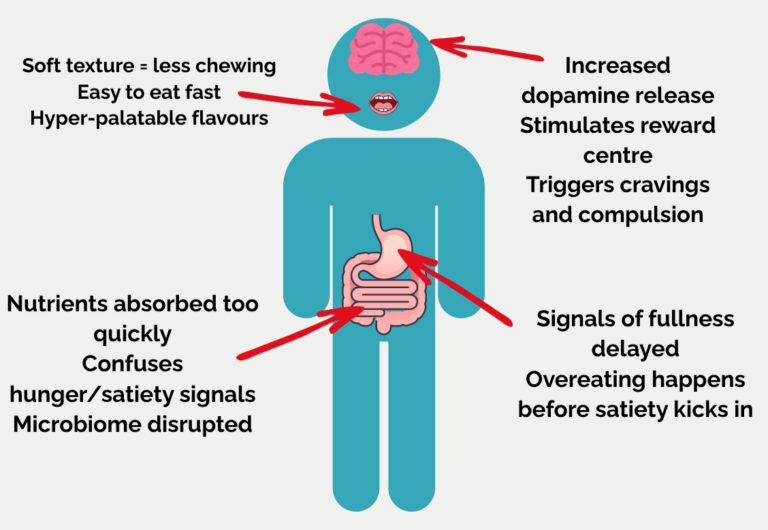Let’s begin with a simple truth: the rise in obesity is not a failure of personal willpower. It’s a reflection of how modern food environments have changed. And right at the heart of that change? Ultra-processed foods.
You may not have heard the term ultra-processed before joining Slimpod, but I’ll bet you’ve experienced their pull – that craving for crisps, biscuits, or that ready-meal you grab after a long day. They’re quick, they’re tasty… but they’re also quietly rewiring our behaviour around food.
So what exactly are ultra-processed foods?
Put simply, they’re foods that have been broken down, reassembled and boosted with additives to taste great and last long on shelves. Think of things like fizzy drinks, packaged snacks, breakfast cereals, fast food. They’re often soft, easy to chew, and packed with sugar, fat, or salt in just the right combinations to keep us coming back for more.
The science: Why do they lead to overeating?
It’s not just about the calories. It’s about how these foods bypass our natural signals, as a scientific review in Nature recently showed. The softness means we chew less, eat faster, and don’t give our bodies time to feel full. The flavours are so intense they override our internal satiety cues. Even our gut – that powerful ally in managing hunger – can become confused by the speed and intensity with which nutrients are absorbed.
And then there’s the reward system in our brain. Ultra-processed foods stimulate it in ways that natural foods rarely do. This creates a cycle of craving, overeating, and – for many – guilt and shame.

Sound familiar?
But it’s not just about the food
This is where Slimpod steps in. Because yes, while understanding the biology helps, the real power lies in retraining your mind to feel in control again. We do that by gradually shifting those unconscious patterns that lead to overconsumption.
And here’s the wonderful thing: once your subconscious starts working with you – not against you – the magnetic pull of those foods begins to fade.
What you can start doing today?
Here are three practical steps to start loosening the grip of ultra-processed foods:
- Notice your triggers
Are you reaching for the biscuits when you’re tired, stressed, or bored? Start writing down these moments. Awareness is the first step to change.
- Slow things down
If you do have something ultra-processed, pause. Chew slowly. Put your fork down between bites. Give your body time to speak.
- Shift your environment
Try keeping healthier, more natural snacks at eye level. Make the better choice the easier one. Try preparing an extra portion or two when you cook and throw it into the freezer for the days you don’t feel like cooking.
This isn’t about perfection
If you’re in the early weeks of your Slimpod journey, please don’t panic if you’re still eating these foods. It’s not about going cold turkey. It’s about beginning to understand what they do, how they affect you – and letting your pod gently help you make better choices.
If you’re further along and starting to feel that shift already, celebrate it. These are not small wins. They’re evidence that your mind is learning a new way of being. And if you’re someone who already feels free of their pull – keep inspiring those around you. You’re proof that change is not only possible, it’s sustainable.
Final thoughts
The food landscape is complex and often stacked against us. But you’re not powerless in it. Every time you notice, pause, or make a choice from a place of freedom – not compulsion – you’re taking back control.
You’re not broken. You’re adapting. And with the right support, you can thrive.





1 thought on “Why Ultra-Processed Foods Make You Overeat (It’s Not Your Fault)”
I’m struggling a little picking a tiny amount here and there, lots of time I do say no to myself, I do listen to Slimpod ever night ,I have maintained my weight over 3 weeks so that’s a win , reading your comments have kicked in . Thank you